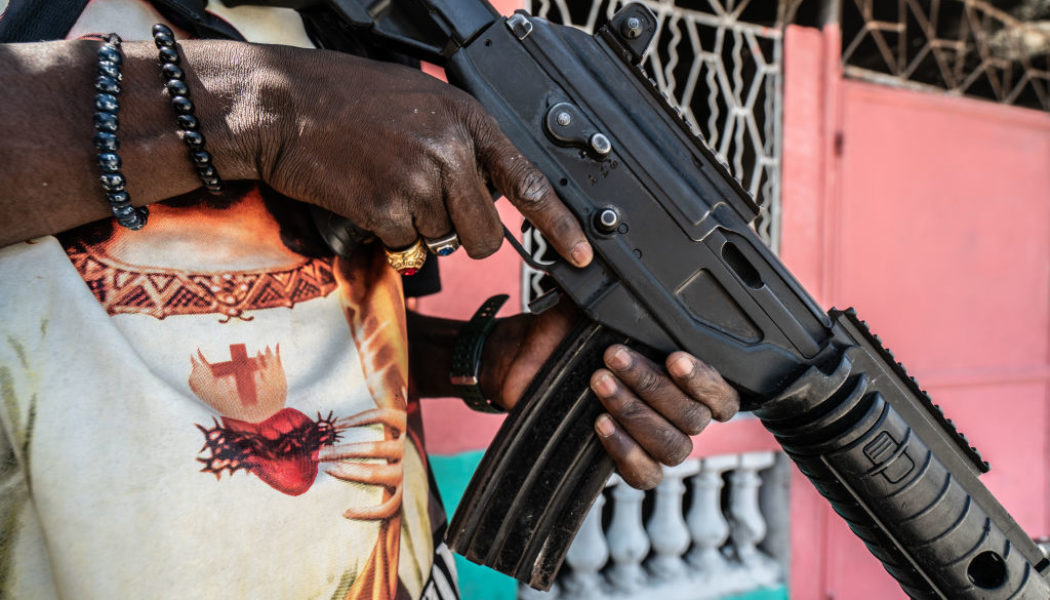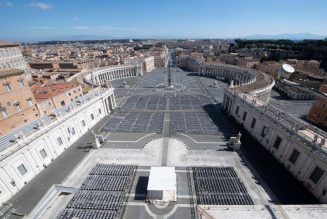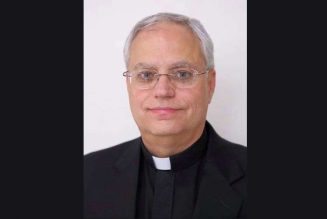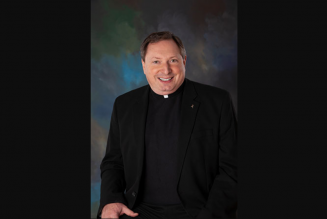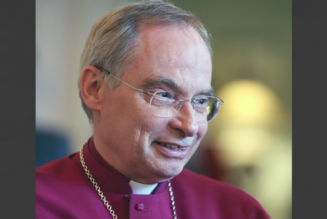Editor’s Note: This story has been updated.
As conditions in Haiti rapidly deteriorate, the Biden administration has warned that its teetering government could fall any day, while a leading archbishop said he fears that the country is on the verge of civil war.
People in Haiti and charity leaders in the United States who have been active in the Caribbean nation told the Register that despite the country’s long history of hardships — including a devastating earthquake in 2010 that killed more than 100,000 people — they have never seen conditions this bad.
“We keep hitting rock bottom, but afterward we find out that there’s a sub-level of rock bottom that we keep digging ourselves through,” said Stephan Destin, executive director of PROCHE, also known as Partnership for Reconstruction, which rebuilds Catholic churches, schools, convents, hospitals and seminaries. That work has come to a virtual halt, he said.
Pope Francis on March 10 urged Catholics to plead with the Blessed Virgin Mary to intercede on Haiti’s behalf, adding in a social-media post that he is “close to the Church and the dear Haitian people, who have suffered from many hardships for years.”
Well-armed gangs now control much of the capital, Port-au-Prince, including the port, airport and several major roads, which has sharply curtailed food distribution and sparked fears of famine.
On Jan. 19, six Catholic religious sisters were kidnapped by armed gunmen who hijacked a bus in Port-au-Prince. The sisters were freed Jan. 25.
Bishop Pierre-André Dumas of Anse-à-Veau was injured in an explosion on Feb. 18.
On March 2, gangs broke into two major prisons in Port-au-Prince and freed more than 3,500 prisoners.
Haiti’s acting prime minister, Ariel Henry, announced Monday night he plans to resign once a transitional council is in place. The announcement came days after he was unable to return to the country since going to Kenya to ask for military intervention in late February. Gang leaders would not let his airplane land in Port-au-Prince, and they said they would kill him if he came back.
Henry’s position was undermined by widespread lack of trust in his authority. Critics accused him of corruption and worse.
Haiti has not had elections since November 2016. Henry, who had been appointed by Haiti’s late president, had said he could not call elections until social order were restored.
To many observers, the prime minister’s resignation seemed like a formality, since he cannot return to the country. Even with the announcement, though, a former government official in Haiti said it’s not clear it will improve the situation in the country.
“I don’t think we are getting better; I think the disaster has just started,” said Matthias Pierre, a former elections minister in Haiti, in an interview with the BBC broadcast Tuesday morning.
The breakdown of order is felt in many parts of the country.
“Right now, I really don’t feel safe,” Destin said in an interview with EWTN Nightly News on March 5. “… The area that I’m at right now is not really attacked. However, with 80% of the capital being under the control of the gangs, the situation has been deteriorating.”
Gang Tollbooths
Destin lives in Petion-Ville, the suburb of the country’s capital where Haiti’s last elected president, Jovenel Moïse, was assassinated in July 2021. That slaying undercut the authority of the government and led to increasingly bold activity by gangs, who now control almost all of the capital and much of the surrounding region.
Destin’s hometown is in better shape than nearby Port-au-Prince, but only by degrees, he said.
“The atmosphere in Petion-Ville has changed. If you need to get something, get out and get it, but make sure you don’t stay too long in the streets. Because at any point things can shift immediately,” Destin said by telephone late last week.
Haiti’s capital and largest city, Port-au-Prince, sits on a harbor connected to a bay that divides the country between a long and narrow southern peninsula that runs east-west and a larger, more block-shaped northern peninsula. Three major roads — Route 1, Route 2 and Route 3 — run to and from the capital. Gangs control all of them. They stop trucks and other vehicles in their territory and charge them to continue, or loot the contents and kidnap passengers for ransom.

“The entrance from the south side alone has at least four major gangs that are controlling the roads and getting payments from people to let them through,” said Father Louis Merosne, pastor of the Cathedral of St. Anne in Anse-a-Veau, on the north-central coast of the southern peninsula. “It’s basically a gang tollbooth that is there.”
The gang tolls decrease the supply of food and increase the price. One example: In October 2022, an Indiana-based organization called Dignity for Haiti sent 36 bags of rice and beans (110 pounds per bag) to a parish on the island of La Gonâve, which is about 30 miles west of Port-au-Prince. After gang confiscations, only 28 made it there, a loss of nearly 900 pounds of food, said Mike Wack, the founder of the organization.
Inflation in Haiti as of January 2024 was running at more than 20% annually.
Food is three times more expensive than it used to be, said Father Raynold Telusmas Celestin, pastor of Notre Dame du Perpétuel Secours (Our Lady of Perpetual Help), the parish Dignity for Haiti’s rice bags were meant for.
Gangs are looting boats and challenging boat captains at ports, leading to food shortages on La Gonâve, a 287-square-mile island with about 87,000 people, Father Celestin said.
“Many people come to me to explain their problem,” Father Celestin told the Register by email in French. “… Yet I have nothing to give. If it stays like this, I have no doubt that many will starve.”
Compared to Port-au-Prince, the coastal city of Cap-Haitien 85 miles to the north is relatively calm. But charitable endeavors still have a gauntlet to run.
Ernest Dwight, chairman of Hands for Haiti, a charity based in Charlotte, North Carolina, told the Register that customs officials there are holding up a container of supplies, demanding more than three times as much as the normal rate. The group provides money and supplies for a Catholic school about 45 minutes outside Cap-Haitien and for the charitable works of the Missionaries of the Poor religious order.
“We were told it would cost $17,000 in duties to get that container released. And I don’t think that money’s going into the Haitian treasury,” Dwight said. “There’s speculation that it’s going into people’s pockets.”
‘Hunger Was Already a Problem’
Haiti, which shares the island of Hispaniola with the Dominican Republic, is about 600 miles southeast of the United States.
Food is hard to grow in much of the country because deforestation degraded the soil. The country must import food to feed its people. Many Haitians have trouble affording it.
“The kids literally — I’ve seen it — will be digging in the old, dried-up cornfields looking for kernels to eat,” said Sean Forrest, founder of Haiti 180, an organization that runs a Catholic school, a children’s home, a home for the elderly and a medical facility in Miragoâne, about 65 miles west of the capital on the country’s southern peninsula.
Food is now harder to find than ever.
“So I foresee hunger rising. Hunger was already a problem. I foresee petty crime rising, as people feel pressured,” said Father Merosne. “When people get in these very pressured situations, they tend to react in inhumane and unreasonable ways.”

It’s heartbreaking for Haitians and for Americans involved in charitable work in Haiti.
“I tell people: Don’t condemn Haiti. Ninety-nine percent of the people are good. And they want to eat and they want to pray,” Forrest said. “But the gangs have run amok.”
Wack said the faith of the Haitians is extraordinary.
“I don’t know how they do it. But they’re very prayerful people, and they believe that God will take care of them,” Wack said.
Forrest told the Register he was last in Haiti in late January, but that he is in daily contact with people at the mission amid their efforts to keep the children, elderly and patients under their care safe.
The area is much safer than Port-au-Prince, he said, but the violence is getting closer, and everyone is affected by the road closures caused by gangs.
“People are scared. They’re just terrified. They see violence, and what can they do?” Forrest said.
Bishop Recovering Slowly
Father Merosne spoke to the Register late last week by telephone from Miami, where he was visiting Bishop Dumas, who was brought there to be treated for his injuries. Authorities have not said whether the explosion was an accident or intentional, but Church authorities are suspicious because Bishop Dumas has been an outspoken critic of the government.
The bishop, who sustained serious burns in the blast, got a medical flight to Miami on Feb. 24 and spent 10 days in intensive care at a hospital there before being released to a regular room on March 5, Father Merosne said. As of late last week, the bishop was able to take only a few steps at a time, he said.
Asked what Haiti needs to improve the situation, Father Merosne told the Register that Haitian politicians need to work out a deal to get a grip on government authority and that the country also needs help from other countries.
Restoration of order should be Haiti’s top priority, Father Merosne said.
“The chaos has grown exponentially. The first thing is to take care of this gang problem, round up all these people and get some justice,” Father Merosne said. “Once they’ve done that, they can talk about reconciliation and coming together as a people and organizing a fair election.”
Father Merosne said he sees sadness, restlessness and anger from people because of what happened to Bishop Dumas and what is happening in the country.
“But there’s also gratitude that we are alive and our bishop is alive. And we’re not going to give up on Haiti,” Father Merosne said. “We’re going to keep proclaiming the Gospel, and we’ll be there ’til the end.”
